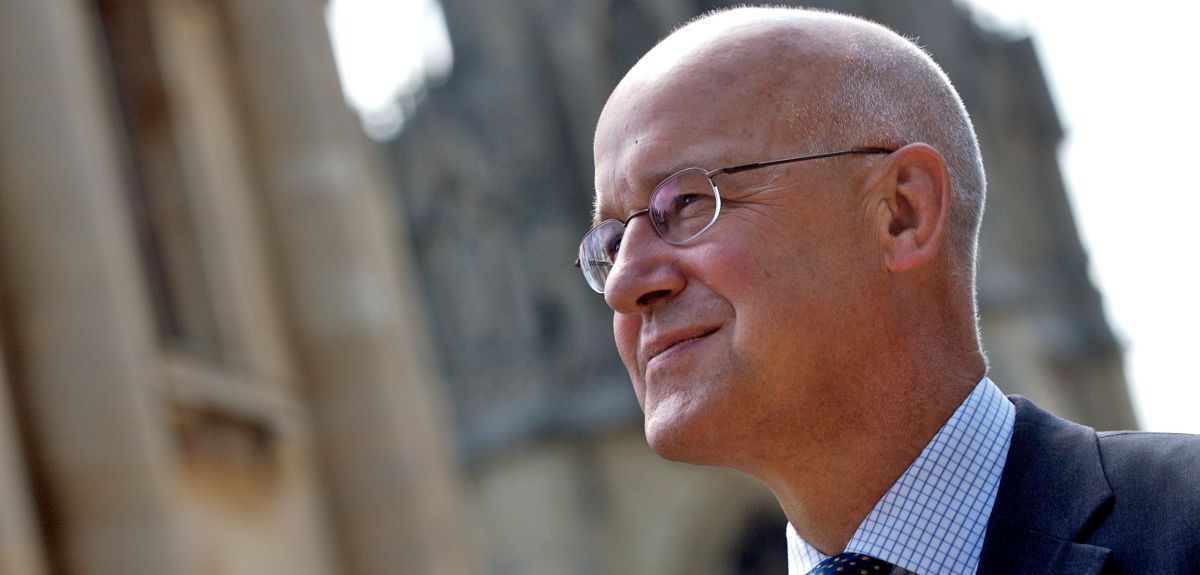
Vice-Chancellor speaks out for higher education investment
Oration highlights how universities benefit the ‘public good’.
Higher education is 'just about the most important investment a nation can make on behalf of its citizens,' Oxford University Vice-Chancellor Professor Andrew Hamilton has declared in his annual Oration.
In a wide-ranging address to Congregation, Professor Hamilton made the case for increased public investment in universities by outlining the many benefits that world-class higher education brings to the region, the UK and the world.
The benefits, Professor Hamilton said, included providing the information and expertise that can improve the quality of political debate and decision-making. He gave as an example the issue of student visas, where he believes current policy is directly harming UK interests.
He told Congregation: 'Wherever I travel in the world, particularly in China and India, one question persists. Why has the UK adopted a visa system so hostile to student entry? I do my best to answer but, frankly, the question baffles me as well. For the first time in decades, the number of international students at our universities has dropped, most markedly from India. Why are we doing this to them – and to ourselves?'
Research by the University’s own Migration Observatory, Professor Hamilton argued, had shown that the public do not link overseas student numbers with immigration issues. He said: 'Study is the least frequent answer given when the public are asked what they consider the motives for migration to be. Student migration simply isn’t an issue for them and there are few votes in restricting overseas student numbers. There are signs that this reality is beginning to dawn across the political spectrum; something to be welcomed and encouraged ahead of the election.'
Professor Hamilton said the example of immigration gave 'some sense of what universities like Oxford can bring to complex political and policy challenges; ones that defy the temptation to reach for simple or simplistic answers. In essence, we can provide the data, the understanding and the analysis to underpin arguments and the possible solutions for the problems we all face.'
Professor Hamilton also addressed Oxford’s regional impact, describing the University as crucial to the region’s economic ambitions. Oxford had been instrumental in shaping two of this year’s major funding announcements – the City Deal and the Oxfordshire Growth Deal – around knowledge based growth. Over time, these will unleash investment of more than £1.3bn in local infrastructure and innovation. The University will be at the heart of both deals, driving new initiatives in high-tech spin-outs, life science enterprises and the region’s world-leading cluster of superconductor businesses.
Professor Hamilton added: 'Our economic involvement does not end with these ambitious deals. We understand the problems our region faces, great and small. Wherever there is an issue to be tackled, you are likely to find an Oxford researcher working on the solution.'
Turning to the University’s international contribution, Professor Hamilton paid tribute to the 1500 staff of the Oxford Tropical Medicine Laboratories, working around the world in the fight against malaria, HIV-AIDS, tuberculosis and many others. Following the devastating outbreak of Ebola in West Africa, Oxford has been called in to spearhead two global alliances to tackle the growing tragedy. Trials of potential new treatments are being fast-tracked in West Africa, led by Dr Peter Horby of the Centre for Tropical Medicine and Global Health and ISARIC, the International Severe Acute Respiratory and Emerging Infection Consortium. Meanwhile the Jenner Institute, under the directorship of Professor Adrian Hill, is leading the effort to find a safe and reliable vaccine to guard against the disease.
Professor Hamilton was clear that universities should be free to follow their own research agendas, rather than have them dictated by economic and political interests. He argued that often, research’s greatest impact came from unforeseen consequences. For example, doctoral student Torsten Reil’s zoological research led to the creation of Oxford-based digital animation company NaturalMotion, valued at more $500m in an international deal earlier this year.
However, Professor Hamilton argued that the undisputed benefit of Oxford and other UK universities was not matched by the level of public investment in the sector. Recent figures showed that UK public investment higher education, at 0.9 per cent of GDP, was one of the lowest in Europe and below the OECD average. He also pointed to “dismaying” government figures showing that research and development investment fell to 1.72 per cent of investment in 2012, at a time when most international competitors were increasing spending.
Professor Hamilton concluded his address: '...It is still all too rare to hear higher education described, accurately, as just about the most important investment a nation can make on behalf of its citizens, especially when those citizens are living in a knowledge-based global economy. That’s why I have somewhat limited expectation, come the general election, that properly developed policies on higher education (as opposed to vain-glorious point-scoring on past crimes and misdemeanours) will take up much of the politicians’ time or attention. That’s sad -- because it is exactly the sort of issue on which a real effort to find a new, meaningful consensus between the parties would be of immense benefit — benefit, of course, to the students and to the universities of the future, but also, as I hope to have demonstrated this morning, hugely beneficial to the public good.'
 New study on Amazonia's fire crises urges action ahead of the next burning season
New study on Amazonia's fire crises urges action ahead of the next burning season
 New heart disease calculator could save lives by identifying high-risk patients missed by current tools
New heart disease calculator could save lives by identifying high-risk patients missed by current tools
 Modern Slavery and Human Rights Policy and Evidence Centre moves to Oxford University after receiving continuation funding
Modern Slavery and Human Rights Policy and Evidence Centre moves to Oxford University after receiving continuation funding
 Study shows that island bats are valuable allies for farmers
Study shows that island bats are valuable allies for farmers
 Study reveals how humanity could unite to address global challenges
Study reveals how humanity could unite to address global challenges